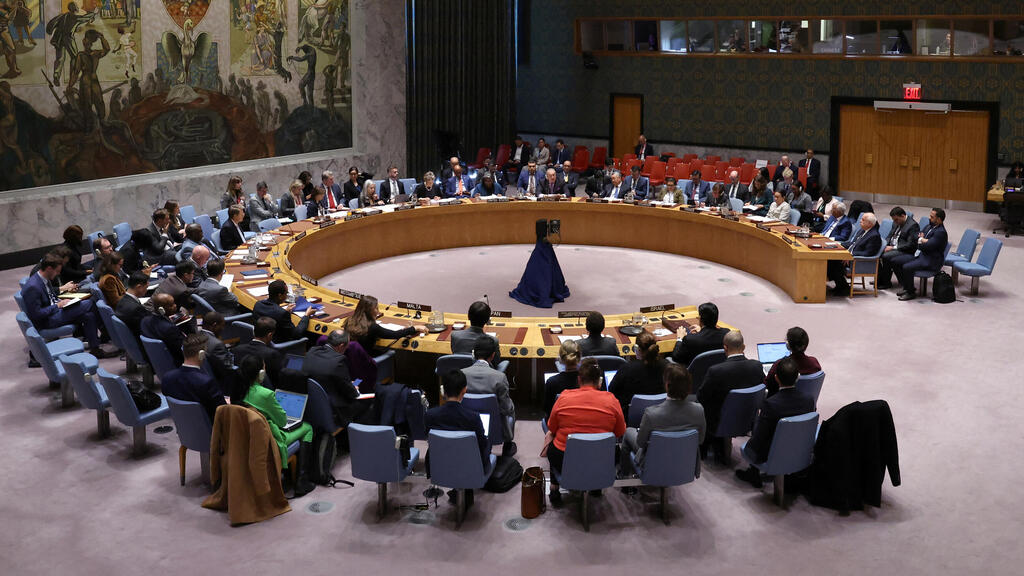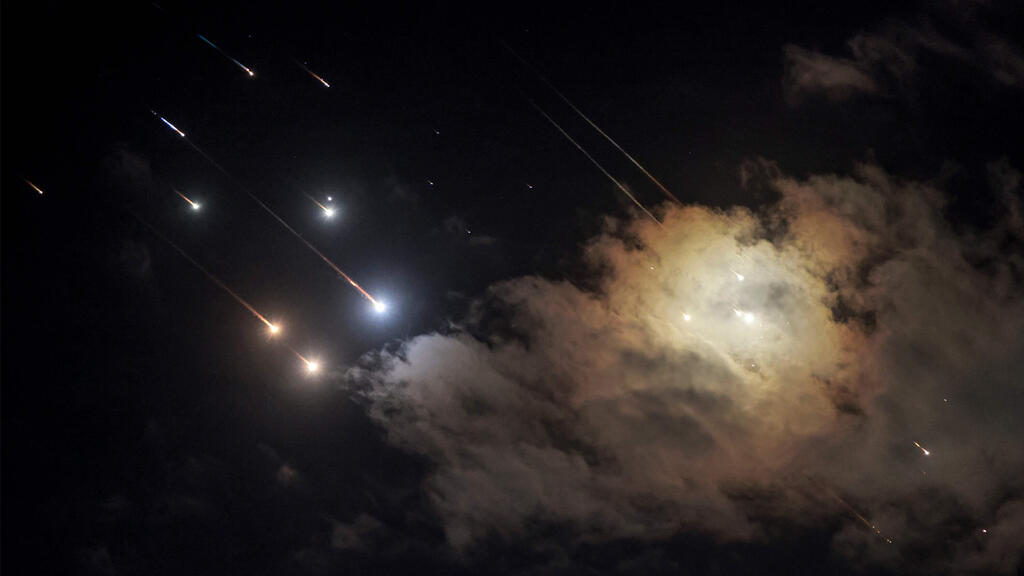Getting your Trinity Audio player ready...
In response to a request from Algeria, Russia and Iran, the UN Security Council (UNSC) held an emergency session on October 29, 2024, to discuss Israel’s response to coming under attack from Iran. At the session, the UNSC once more yielded to anti-Israeli propaganda.
The moral abasement of the UNSC, which was reflected in the mere convening of such a discussion, is unsurprising in light of the decisions that the UNSC has taken since the October 7 massacre.
For more than a year, Israel has been assaulted on seven different fronts. Terrorist organizations are doing all they can to murder Jews and destroy the Israeli state. Encouraged and sponsored by the Iranian regime, which openly proclaims its goal of wiping out the Jewish state, they joined forces to attack Israel.
Although it has held many discussions of “the Middle East situation,” the UNSC has proven itself helpless against the attacks by the ayatollahs of Tehran and their terrorist proxies.
Since the October 7 massacre, the UNSC has adopted no fewer than fourteen resolutions regarding the Middle East.
Seven of the resolutions dealt partly with the obligation to fight against the threat that terrorism poses to global security – not including Palestinian terrorism, of course – and partly with expanding the mandate of the UN organizations in the Middle East. None of those resolutions mentioned the massacre, the Palestinian terrorists, the Palestinian terror organizations, Hezbollah or Iran.
The other seven resolutions directly addressed the “armed conflict” between the terrorists and Israel, but they never mentioned that the terrorists, on every front, were those who had initiated the attacks and the conflict.
The moral failure of the UNSC throughout the year has been so great as to prevent it even from mustering an unambiguous condemnation of the Palestinian terrorists – Hamas, Palestinian Islamic Jihad, the Popular Front for the Liberation of Palestine, the Al-Aqsa Martyrs’ Brigades and others – who committed the massacre, let alone recommending that the UN designate them as terrorist organizations.
Nor has the UNSC managed to pronounce any condemnation of Hezbollah in Lebanon, which many countries have designated as a terrorist organization, for its aggression against Israel. It has also not managed to condemn the Iranian regime, which in two separate attacks launched more than 500 warheads – some on ballistic missiles, some on cruise missiles and exploding drones – at the state of Israel and its citizens.
The loss of the UNSC’s moral compass was especially prominent regarding the fundamental requirement that the Gazan terrorists free the hostages they are holding.
Granted, the UNSC initially did demand, albeit a month late, “the immediate and unconditional release of all hostages held by Hamas and other groups.” But as time passed and it became increasingly clear that the terrorists were ignoring the demand, the UNSC changed its tack.
Instead of applying more pressure on the terrorists and terror supporters, the UNSC decided to intensify the pressure specifically on Israel. As time passed, the demand to release the hostages unconditionally was reduced to a demand for their release as wrapped inside a demand for a phased Israeli surrender to the terrorists – which was to include a cease-fire, the implementation of a “central multi-year recovery program for Gaza,” and recompense in the form of a euphemistically termed “exchange of Palestinian prisoners” that means, of course, freeing hundreds of murderous terrorists.
It is important to remember that, unlike the UN General Assembly with its clear anti-Israeli majority, the UNSC does not adopt decisions by majority vote. The UNSC is composed of 15 countries, including the US, UK, France, China and Russia as permanent members and 10 other countries that are each appointed for a limited term. The five permanent members hold veto power over all UNSC decisions. The other countries that have served on the UNSC during the past year are Algeria, Ecuador, Guyana, Japan, Malta, Mozambique, Sierra Leone, Slovenia, South Korea and Switzerland. That is to say, even democratic countries maintaining relatively satisfactory relations with Israel, and even the U.S., abstained or supported the above resolutions. The difficulty of passing a resolution against terrorist actors, and Iran, is clear in light of the predictable resistance from Russia and China — but it is no excuse for passing resolutions that chastise Israel while ignoring the deeds of terrorist actors.
That said, it is also important to note that most of the UNSC decisions during the past year, including all the decisions regarding Israel, were adopted outside the authority of Chapter VII of the UN Charter, so that their weight is merely declarative.
But, in addition, Israel may face further challenges in the near future because the reelection of former U.S. President Donald Trump. It was in late December 2016, during the interregnum between the Obama and first Trump administrations, that the UNSC adopted Resolution 2334. Like other resolutions adopted during the past year, it ignored the ring of fire which Iran has kindled around Israel, ignored Iran’s terrorist proxies, and even ignored the rejection of all proposed solutions to the Israel–Palestinian dispute, not to mention the Palestinian Authority’s open support for terrorism.
Rather than clearly indicating the source of the danger to Middle Eastern security, the resolution focused almost exclusively on Israeli settlement in Jerusalem and the West Bank, characterizing it as a substantial obstacle to attaining the vision of two states and lasting peace. This resolution was adopted without intervention from the U.S. – and some have even claimed that the Obama administration invited and encouraged it – despite the public opposition of then president-elect Trump.
Similarly, there are genuine fears that in the months between now and January 2025, the Biden administration will enable the UNSC members to adopt further imbalanced resolutions that ignore reality and censure the State of Israel. In fact, some of the states that spoke at the special session even called upon the UNSC to adopt resolutions under Chapter VII of the UN Charter and thus provide for armed foreign intervention against the State of Israel. There is still a significant danger that the outgoing Biden administration may decide not to veto a Palestinian request to fully admit the “State of Palestine” as a UN member state.
Iranian rockets fired on Israel
If the UNSC would like to retain even a bit of its dignity, not to mention its legitimacy, it must be prepared to clearly identify the true aggressors and impose sanctions on them. In absolute contrast to the content of most UNSC discussions, the source of the terrorism, the danger, and the culpability for damaging the security of the Middle East, is Iran and not Israel.
For more than a year, Iran and its terrorist proxies perpetrated tens of thousands of attacks against the Israeli state and citizens. From the atrocities committed by the Gazan terrorists on October 7 through the war started by Hezbollah, and on to the ballistic missile attacks and drone attacks by the Houthis, Iran, and the Iranian axis of evil, they have done everything in their power to assail Israel, kill Jews, and sabotage the expansion of the Abraham Accords.
Despite the clear facts, the message that echoes worldwide from the UNSC is that it simply finds the massacre of Jews, and the continuing threat against the sole Jewish state, uninteresting.
 Lt. Col. (res.) Maurice Hirsch
Lt. Col. (res.) Maurice HirschLike the UN General Assembly, the UNSC has sunk to attacking Israel. Instead of pointing clearly to the Iranian aggressor and its terrorist proxies, the UNSC has knuckled under to the belligerence and terrorism of the ayatollahs.
While the failure to unambiguously condemn the October 7 massacre, and the decision not to apply sanctions to Iran and its terrorist proxies, will leave a permanent stain on the UNSC, the failure to clearly identify the short-term and long-term threats posed to global security and stability by Iran and its terrorist proxies is a greater failure and is liable to bring forth much more extensive ramifications.
- Lt. Col. (res.) Maurice Hirsch is the Director of the Initiative for Palestinian Authority Accountability and Reform in the Jerusalem Center for Public Affairs, a member of the IDSF and the former Director of the Military Prosecution for Judea and Samaria






